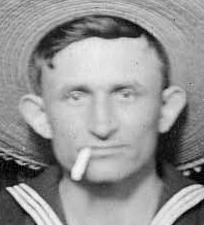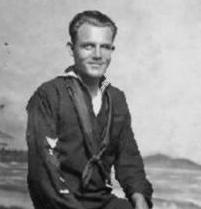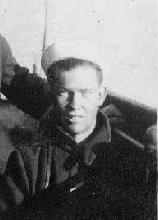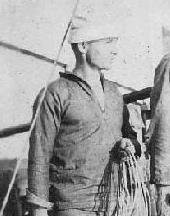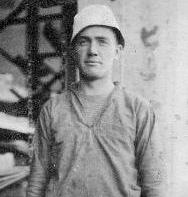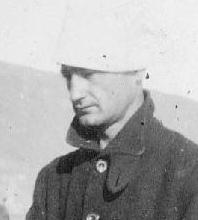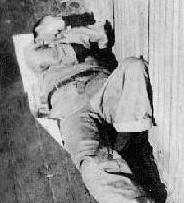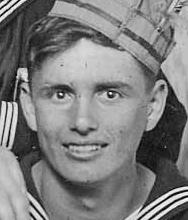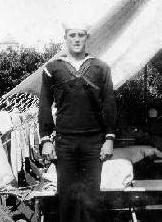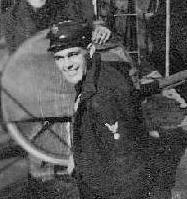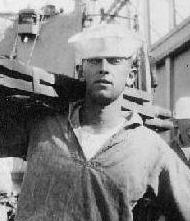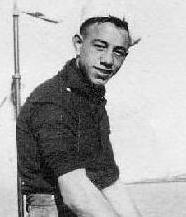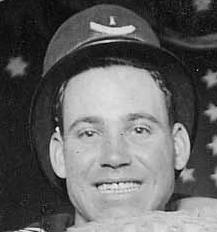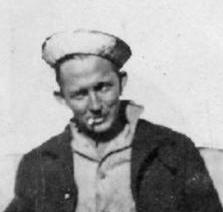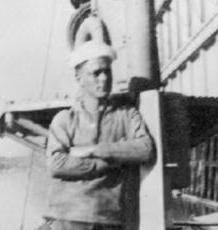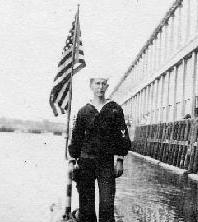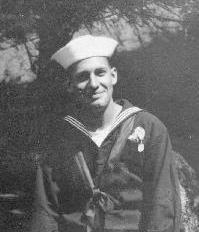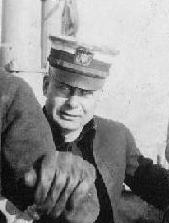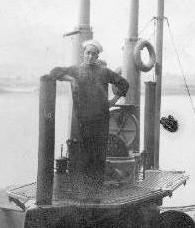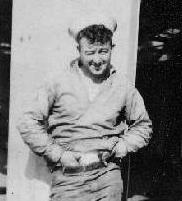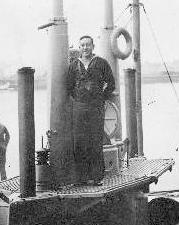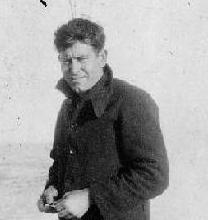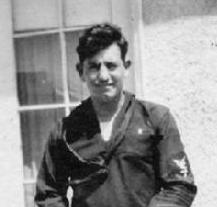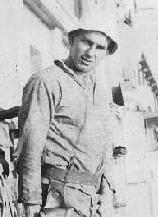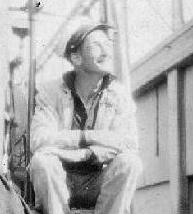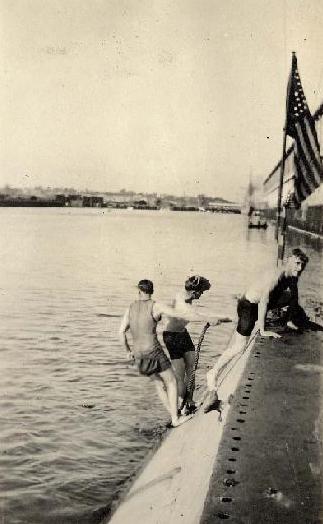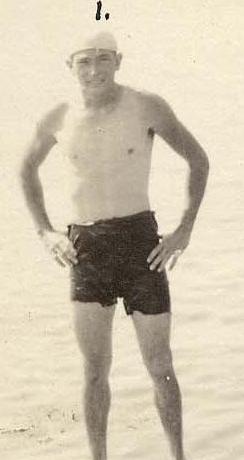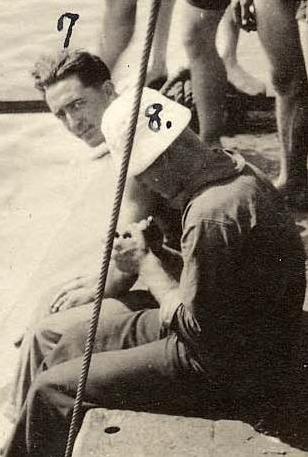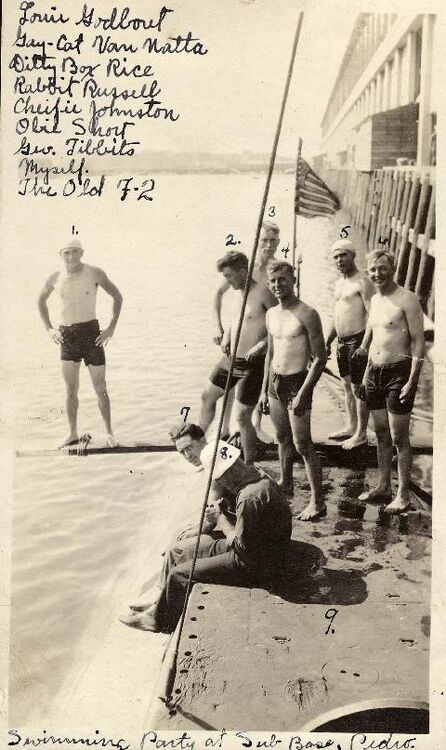F-2: Difference between revisions
Pbcjohnston (talk | contribs) Added photos |
Pbcjohnston (talk | contribs) Added new Header |
||
| (8 intermediate revisions by 2 users not shown) | |||
| Line 1: | Line 1: | ||
[[File:F- | [[File:New Header F-class.jpg]] | ||
=== Exterior Views, Hawaii and California === | |||
[[File:F-2 at pier.jpg|left|500px]] | [[File:F-2 at pier.jpg|left|500px]] | ||
<div style="text-align: justify;"><span style="color:#00008B"> | <div style="text-align: justify;"><span style="color:#00008B">F-2 moored at the commercial piers at the foot of Bishop St. in Honolulu, circa 1915. The submarine base at Pearl Harbor did not yet exist so the F-class boats operated out of rented space in Honolulu Harbor. | ||
<small>Photo in the private collection of Ric Hedman</small> | <small>Photo in the private collection of Ric Hedman.</small> | ||
[[File:Red bar sub new.jpg]] | |||
[[File:F-2 Frisco with smoke.jpg|left|500px]] | [[File:F-2 Frisco with smoke.jpg|left|500px]] | ||
F-2 Steaming in San Francisco Bay circa 1916 after the return to the mainland from Hawaii. The three remaining F-class subs were ordered back to the mainland after the sinking of the F-4. The F-class were replaced in Hawaii by the newer K-class submarines. | |||
In the background can be seen the early skyline and waterfront of San Francisco. | |||
<small>Photo in the private collection of Ric Hedman.</small> | |||
[[File:Red bar sub new.jpg]] | |||
[[File:F-2 port bow.jpg|left|500px]] | [[File:F-2 port bow.jpg|left|500px]] | ||
F-2 returning to port from a surface run at sea, circa 1916-1917. It is not likely that she dived on this run. She has an extensive pipe frame and canvas bridge structure erected over the conning tower fairwater. This had to be taken down before diving. | |||
<small>Photo in the private collection of Ric Hedman.</small> | |||
[[File:Red bar sub new.jpg]] | |||
[[File:F-2 stbd bow.jpg|left|500px]] | [[File:F-2 stbd bow.jpg|left|500px]] | ||
F-2 running at a good clip on the surface off San Diego, CA., approximately 1916-1917. | |||
<small>Photo in the private collection of Ric Hedman.</small> | |||
[[File:Red bar sub new.jpg]] | |||
<div style="text-align: justify;"><span style="color:#000000"> | |||
=== Crew Photos === | |||
</div> | |||
[[File:F-2 Dilley standing.jpg|left|500px]] | [[File:F-2 Dilley standing.jpg|left|500px]] | ||
EM 2c (Radio) Homer "Pat" Dilley aboard the F-2. He is standing next to the #2 periscope shear facing forward. Note that the bridge access hatch open to the aft not forward as is normally typical. This is a very clear, high resolution photo that shows good details of Dilley's uniform along with the mechanism for opening and shutting the conning tower hatch from below. On the far left it can be seen that a temporary grating has been placed over the open hatch. This allows the bridge watchstanders, that included a helmsman, to stand on it while underway. A detachable helm or steering wheel was placed on a hub that was on the aft side of the #1 periscope shear. When not in use it was removed and attached to a stud on the portside of the shear. | |||
<small>Photo courtesy of Mike Dilley, son of Homer Dilley.</small> | |||
[[File:Red bar sub new.jpg]] | |||
[[File:F-2 Dilley at radio.jpg|left|500px]] | [[File:F-2 Dilley at radio.jpg|left|500px]] | ||
Homer "Pat" Dilley at his radio set aboard the F-2, approximately 1916. Wireless communications was still a very new technology in those days. This gear used a lot of power but transmitted a weak signal. It was fairly unreliable and prone to frequent short circuits and burnouts due to the high humidity of the environment on the sub. | |||
<small>Photo courtesy of Mike Dilley, son of Homer Dilley.</small> | |||
[[File:Red bar sub new.jpg]] | [[File:Red bar sub new.jpg]] | ||
<center> | <center> | ||
<gallery mode="packed" widths="200px" heights="300px"> | <gallery mode="packed" widths="200px" heights="300px" caption="Some of the crew of the F-2, circa 1916."> | ||
File:F-2 Blankenship.jpg|Blankenship | File:F-2 Blankenship.jpg|Blankenship | ||
File:F-2 brown.jpg|"Jazz" Brown | File:F-2 brown.jpg|"Jazz" Brown | ||
| Line 45: | Line 82: | ||
</gallery> | </gallery> | ||
</center> | </center> | ||
<div style="text-align: justify;"><span style="color:#00008B"> | <div style="text-align: justify;"><span style="color:#00008B">Note that many of the crew had some rather humorous nicknames. This is something of a tradition in the Submarine Service. The F-2 crew seemed to be a happy and close-knit crew. Dilley had two different pictures of Chefoo Ward, and it is not clear if the two Williams pictures are of the same man. | ||
<small>Photos courtesy of Mike Dilley, son of Homer "Pat" Dilley, F-2 crewman.</small> | |||
[[File:Red bar sub new.jpg]] | [[File:Red bar sub new.jpg]] | ||
[[File:F-2 Reese.jpg|left|500px]] | [[File:F-2 Reese.jpg|left|500px]] | ||
Herman "Jimmy Cheese" Reese. This young man was the Sub Base mascot at San Pedro, California. He was not a member of the U.S. Navy but was allowed on the base. The boat crews treated him as kind of a kid brother. He appears to be about 14 years of age. | |||
<small>Photo courtesy of Mike Dilley, son of Homer Dilley.</small> | |||
[[File:Red bar sub new.jpg]] | |||
[[File:F-2 Rabbit Cheese Gaycat.jpg|left|500px]] | [[File:F-2 Rabbit Cheese Gaycat.jpg|left|500px]] | ||
"Rabbit" Russell, "Jimmy Cheese" Reese, and "Gay Cat" Van Natta clowning around during off duty hours on the pier next to the F-2, circa 1916. | |||
<small>Photo courtesy of Mike Dilley, son of Homer Dilley.</small> | |||
[[File:Red bar sub new.jpg]] | |||
[[File:F-2 crew 1.jpg|left|500px]] | |||
Some of the "Gang" on the F-2, 1916. Notice the tall man in the center, a CPO, and the man to the right of him, not a CPO, have switched hats. | |||
<small>Photo courtesy of Mike Dilley, son of Homer Dilley.</small> | |||
[[File:Red bar sub new.jpg]] | |||
[[File:F-2 crew 2.jpg|left|500px]] | |||
Left to right: "Whan", Anderson, "Rats" Foshia (looking at the camera), Lewis (smoking the pipe), and "Pat" Dilley standing in the hatch. | |||
<small>Photo courtesy of Mike Dilley, son of Homer Dilley.</small> | |||
[[File:Red bar sub new.jpg]] | |||
[[File:F-2 crew 3.jpg|left|500px]] | |||
Photo taken at sea in June of 1917. Projection to side of bridge is a temporary "head", or toilet, for use on surface. | |||
<small>Photo courtesy of Mike Dilley, son of Homer Dilley.</small> | |||
[[File:Red bar sub new.jpg]] | |||
[[File:F-2 crew 4.jpg|left|500px]] | |||
Some of the crew posing for the camera. Homer Dilley is on the far left. | |||
<small>Photo courtesy of Mike Dilley, son of Homer Dilley.</small> | |||
[[File:Red bar sub new.jpg]] | |||
<div style="text-align: justify;"><span style="color:#000000"> | |||
=== Exterior Views, California === | |||
</div> | |||
[[File:F-2 drydock.jpg|left|500px]] | |||
<div style="text-align: justify;"><span style="color:#00008B">F-2 in dry dock in Long Beach, California, approximately 1917. No hull identification can be seen in this photo as is noted in a number of other photos taken after the submarine returned to the mainland from Hawaii. | |||
This view shows the starboard bow with the bow cap turned to expose the #1 and #2 torpedo tubes. The tubes were numbered in an "X" design. #1 was the upper starboard tube and #2 was the lower port tube. Number #3 was the lower starboard tube and #4 was the upper port tube. To completely close off the muzzle ends of the tubes, the cap would be rotated so that the two openings were perpendicular and hidden behind the bow stem. The cap would then be pulled tightly back to seal the ends of the tubes. | |||
<small>Photo courtesy of Mike Dilley, son of Homer Dilley.</small> | |||
[[File:Red bar sub new.jpg]] | |||
[[File:F-2 drydock 2.jpg|left|500px]] | |||
F-2 seen from the starboard quarter while in drydock in Long Beach, CA., 1917. This was likely a civilian owned floating drydock that the Navy was leasing. The Navy did not have a full yard and repair facility in the San Pedro/Long Beach area, only leased piers and storage facilities. | |||
<small>Photo courtesy of Mike Dilley, son of Homer Dilley.</small> | |||
[[File:Red bar sub new.jpg]] | |||
[[File:F-2 circa 1917 San Diego.jpg|left|500px]] | |||
F-2 underway in what is likely San Diego Harbor, circa 1917. She appears to be inbound to the harbor, with the long low North Island in the background. She does not have the canvas bridge structure rigged, indicating that she may have just completed a dive and was "headed for the barn". 12 of her 22 crew are topside, enjoying the fresh California air. Both engines are lit off (smoke puffs on the right) and she has quite a bow wave going, indicating she is moving at close to her top speed of 13 knots. This would have made the boat quite hot below with the engines generating a lot of heat. | |||
<small>Photo in the private collection of Ric Hedman.</small> | |||
[[File:Red bar sub new.jpg]] | |||
[[File:F-2 at sea from bow.jpg|left|500px]] | |||
F-2 bridge at sea. On the bridge, from left to right is the bridge lookout, Campbell. Center is "Rats" Foshia, who the helmsman and on the right, standing in front of the flag, is LT Conant Taylor, CO of the F-2. The projection on the right side is a portable head for use on the surface since sanitary facilities below decks were crude to say the least. Mounted on the bridge is the signal lamp. Foreground left is the torpedo loading davit. Standing just to the right of the bridge fairwater on the back deck is a crewman, his legs and torso only are visible. | |||
<small>Photo courtesy of Mike Dilley, son of Homer Dilley.</small> | |||
[[File:Red bar sub new.jpg]] | |||
[[File:F-2 tubes.jpg|left|500px]] | |||
The "business end" of the F-2. The breech doors of the four tubes swung outward when opened. The large wheel at the top center is for unseating the rotating bow cap, and the smaller crank between the tubes rotated the cap to line up with the tubes. | |||
<small>Photo courtesy of Mike Dilley, son of Homer Dilley.</small> | |||
[[File:Red bar sub new.jpg]] | |||
<div style="text-align: justify;"><span style="color:#000000"> | |||
=== Swim Call, 1917 === | |||
</div> | |||
<center> | |||
<gallery mode="packed" widths="400px" heights="500px"> | |||
File:F-2 swim 1.jpg | |||
File:F-2 swim 2.jpg | |||
File:F-2 swim 3.jpg | |||
File:F-2 swim 4.jpg | |||
File:F-2 swim 5.jpg | |||
File:F-2 swim 6.jpg | |||
</gallery> | |||
</center> | |||
<div style="text-align: justify;"><span style="color:#00008B">Recreational opportunities helped to break up the drudgery of Pigboat life. This series of photos show a swim call in the waters at Submarine Base San Pedro, CA. circa 1917. The callouts in the last photo indicate that a certain "Cheifie Johnston" was one of the participants. Webmaster David Johnston would like to assure you that he is NOT that old. | |||
<small>Photo courtesy of Mike Dilley, son of Homer Dilley.</small> | |||
[[File:Red bar sub new.jpg]] | [[File:Red bar sub new.jpg]] | ||
Latest revision as of 03:14, 14 March 2025
Exterior Views, Hawaii and California
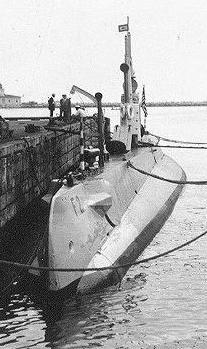
Photo in the private collection of Ric Hedman.
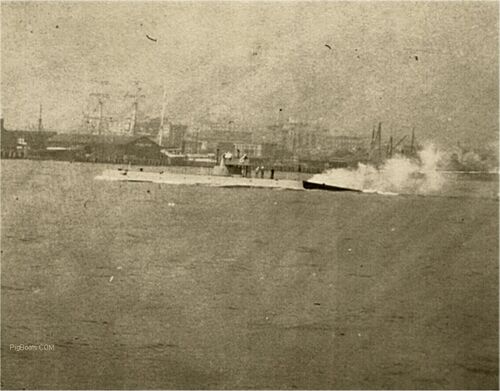
F-2 Steaming in San Francisco Bay circa 1916 after the return to the mainland from Hawaii. The three remaining F-class subs were ordered back to the mainland after the sinking of the F-4. The F-class were replaced in Hawaii by the newer K-class submarines.
In the background can be seen the early skyline and waterfront of San Francisco.
Photo in the private collection of Ric Hedman.

F-2 returning to port from a surface run at sea, circa 1916-1917. It is not likely that she dived on this run. She has an extensive pipe frame and canvas bridge structure erected over the conning tower fairwater. This had to be taken down before diving.
Photo in the private collection of Ric Hedman.
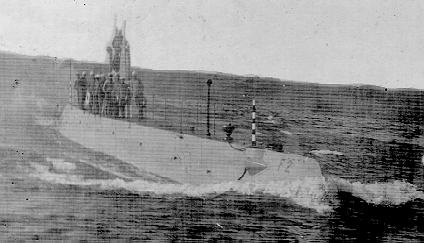
F-2 running at a good clip on the surface off San Diego, CA., approximately 1916-1917.
Photo in the private collection of Ric Hedman.
Crew Photos
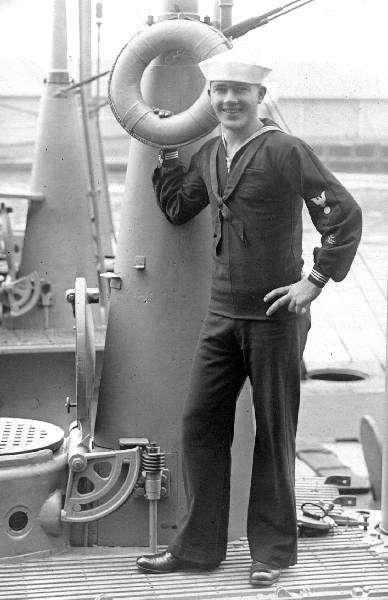
EM 2c (Radio) Homer "Pat" Dilley aboard the F-2. He is standing next to the #2 periscope shear facing forward. Note that the bridge access hatch open to the aft not forward as is normally typical. This is a very clear, high resolution photo that shows good details of Dilley's uniform along with the mechanism for opening and shutting the conning tower hatch from below. On the far left it can be seen that a temporary grating has been placed over the open hatch. This allows the bridge watchstanders, that included a helmsman, to stand on it while underway. A detachable helm or steering wheel was placed on a hub that was on the aft side of the #1 periscope shear. When not in use it was removed and attached to a stud on the portside of the shear.
Photo courtesy of Mike Dilley, son of Homer Dilley.
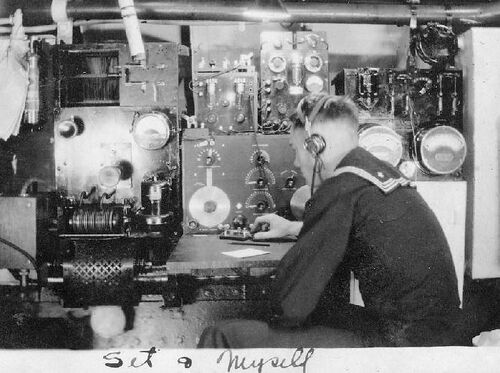
Homer "Pat" Dilley at his radio set aboard the F-2, approximately 1916. Wireless communications was still a very new technology in those days. This gear used a lot of power but transmitted a weak signal. It was fairly unreliable and prone to frequent short circuits and burnouts due to the high humidity of the environment on the sub.
Photo courtesy of Mike Dilley, son of Homer Dilley.
- Some of the crew of the F-2, circa 1916.
-
Blankenship
-
"Jazz" Brown
-
Campbell
-
CPO Monk Cline
-
Harry LeRoy Corson
-
Homer "Pat" Dilley
-
"Rats" Foshia
-
Louie Godbout
-
Grey
-
Tom Henry
-
CPO R.W. Nivison
-
"Rabbit" Russell
-
Phil Salvadore
-
Schmidt
-
D.T. Short
-
C.I. Short
-
"Sitting Bull" Smith
-
"Socks"
-
LT Conant Taylor, Commanding Officer
-
G.N. Tibbits
-
"Gay Cat" Van Natta
-
"Dopey" Walker
-
"Chefoo" Ward
-
"Chefoo" Ward
-
Williams
-
CPO Bill "Dizzy" Williams
Photos courtesy of Mike Dilley, son of Homer "Pat" Dilley, F-2 crewman.
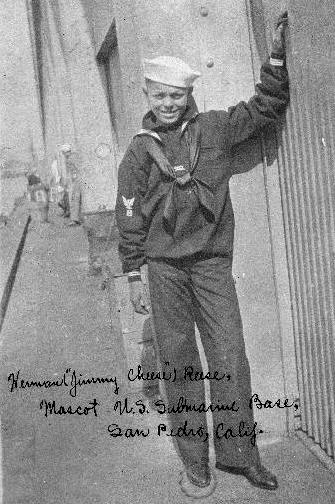
Herman "Jimmy Cheese" Reese. This young man was the Sub Base mascot at San Pedro, California. He was not a member of the U.S. Navy but was allowed on the base. The boat crews treated him as kind of a kid brother. He appears to be about 14 years of age.
Photo courtesy of Mike Dilley, son of Homer Dilley.
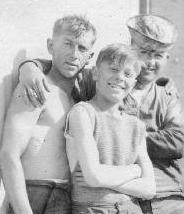
"Rabbit" Russell, "Jimmy Cheese" Reese, and "Gay Cat" Van Natta clowning around during off duty hours on the pier next to the F-2, circa 1916.
Photo courtesy of Mike Dilley, son of Homer Dilley.

Some of the "Gang" on the F-2, 1916. Notice the tall man in the center, a CPO, and the man to the right of him, not a CPO, have switched hats.
Photo courtesy of Mike Dilley, son of Homer Dilley.

Left to right: "Whan", Anderson, "Rats" Foshia (looking at the camera), Lewis (smoking the pipe), and "Pat" Dilley standing in the hatch.
Photo courtesy of Mike Dilley, son of Homer Dilley.

Photo taken at sea in June of 1917. Projection to side of bridge is a temporary "head", or toilet, for use on surface.
Photo courtesy of Mike Dilley, son of Homer Dilley.

Some of the crew posing for the camera. Homer Dilley is on the far left.
Photo courtesy of Mike Dilley, son of Homer Dilley.
Exterior Views, California

This view shows the starboard bow with the bow cap turned to expose the #1 and #2 torpedo tubes. The tubes were numbered in an "X" design. #1 was the upper starboard tube and #2 was the lower port tube. Number #3 was the lower starboard tube and #4 was the upper port tube. To completely close off the muzzle ends of the tubes, the cap would be rotated so that the two openings were perpendicular and hidden behind the bow stem. The cap would then be pulled tightly back to seal the ends of the tubes.
Photo courtesy of Mike Dilley, son of Homer Dilley.
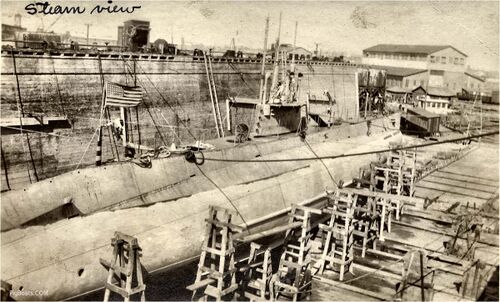
F-2 seen from the starboard quarter while in drydock in Long Beach, CA., 1917. This was likely a civilian owned floating drydock that the Navy was leasing. The Navy did not have a full yard and repair facility in the San Pedro/Long Beach area, only leased piers and storage facilities.
Photo courtesy of Mike Dilley, son of Homer Dilley.
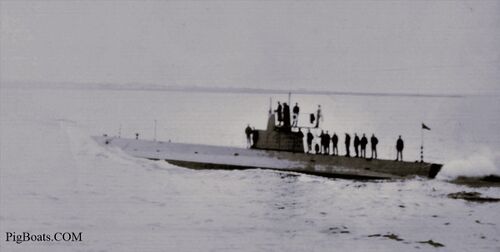
F-2 underway in what is likely San Diego Harbor, circa 1917. She appears to be inbound to the harbor, with the long low North Island in the background. She does not have the canvas bridge structure rigged, indicating that she may have just completed a dive and was "headed for the barn". 12 of her 22 crew are topside, enjoying the fresh California air. Both engines are lit off (smoke puffs on the right) and she has quite a bow wave going, indicating she is moving at close to her top speed of 13 knots. This would have made the boat quite hot below with the engines generating a lot of heat.
Photo in the private collection of Ric Hedman.
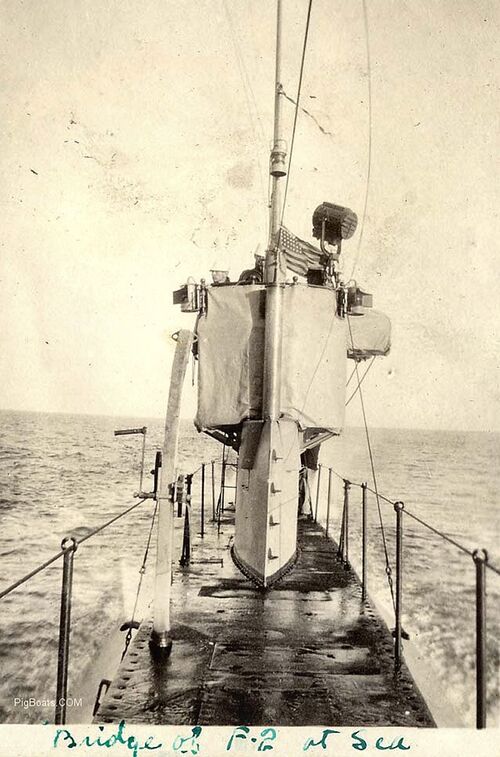
F-2 bridge at sea. On the bridge, from left to right is the bridge lookout, Campbell. Center is "Rats" Foshia, who the helmsman and on the right, standing in front of the flag, is LT Conant Taylor, CO of the F-2. The projection on the right side is a portable head for use on the surface since sanitary facilities below decks were crude to say the least. Mounted on the bridge is the signal lamp. Foreground left is the torpedo loading davit. Standing just to the right of the bridge fairwater on the back deck is a crewman, his legs and torso only are visible.
Photo courtesy of Mike Dilley, son of Homer Dilley.
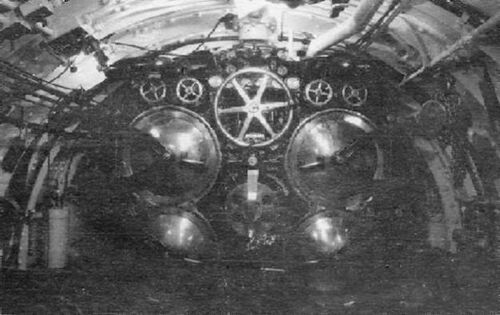
The "business end" of the F-2. The breech doors of the four tubes swung outward when opened. The large wheel at the top center is for unseating the rotating bow cap, and the smaller crank between the tubes rotated the cap to line up with the tubes.
Photo courtesy of Mike Dilley, son of Homer Dilley.
Swim Call, 1917
Photo courtesy of Mike Dilley, son of Homer Dilley.
Page created by:
Ric Hedman & David Johnston
1999 - 2023 - PigBoats.COM©
Mountlake Terrace, WA, Norfolk, VA
webmaster at pigboats dot com

